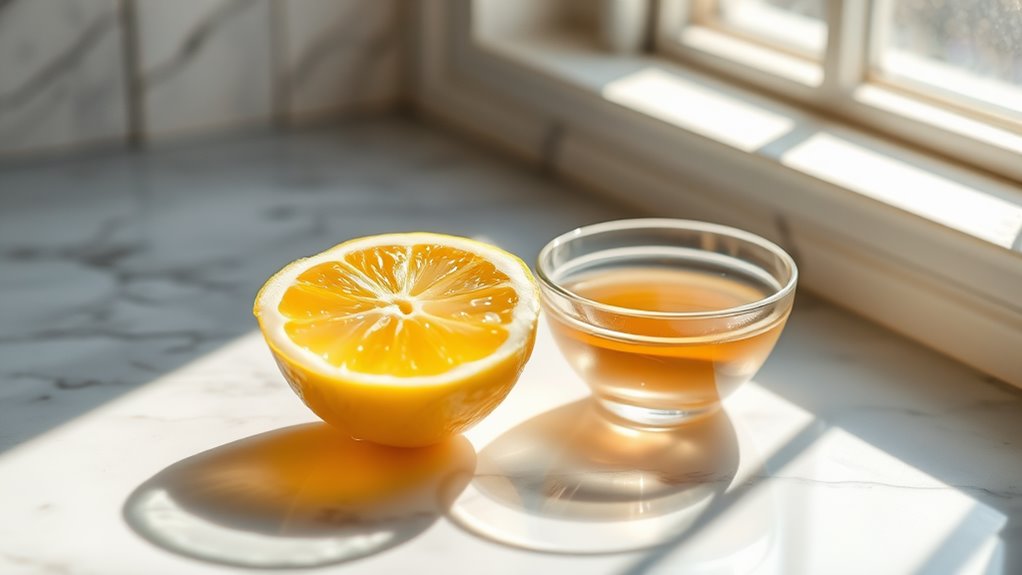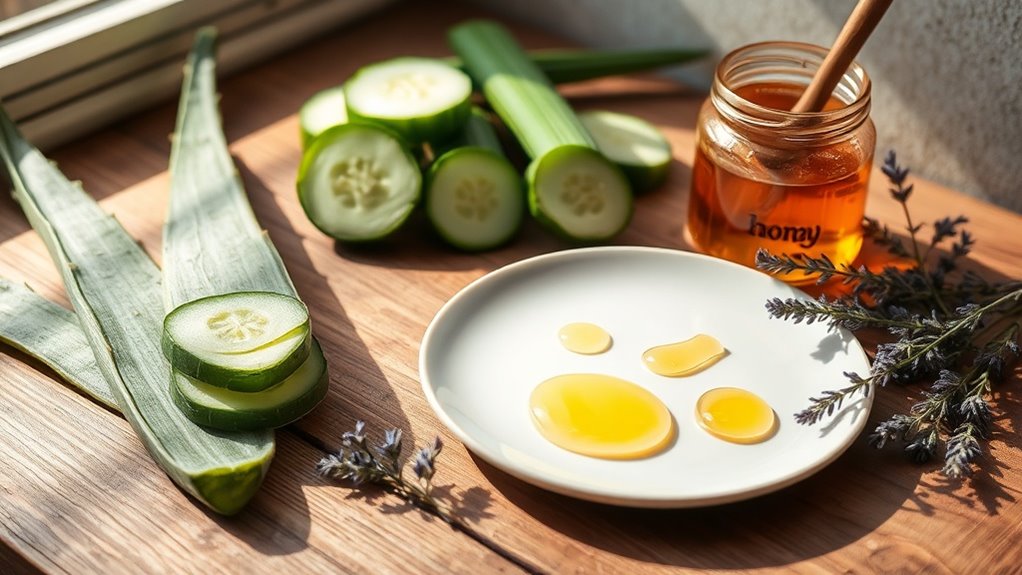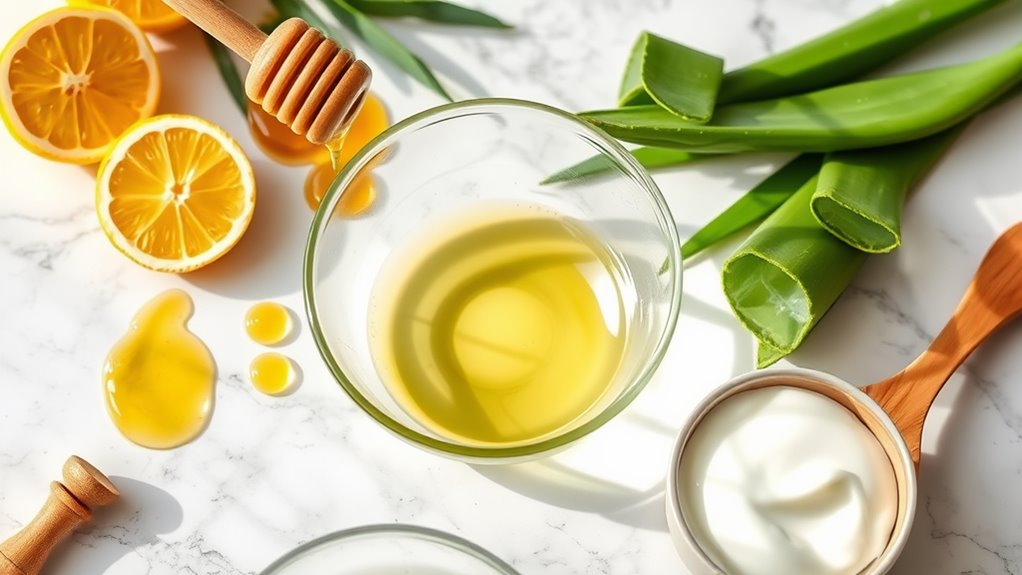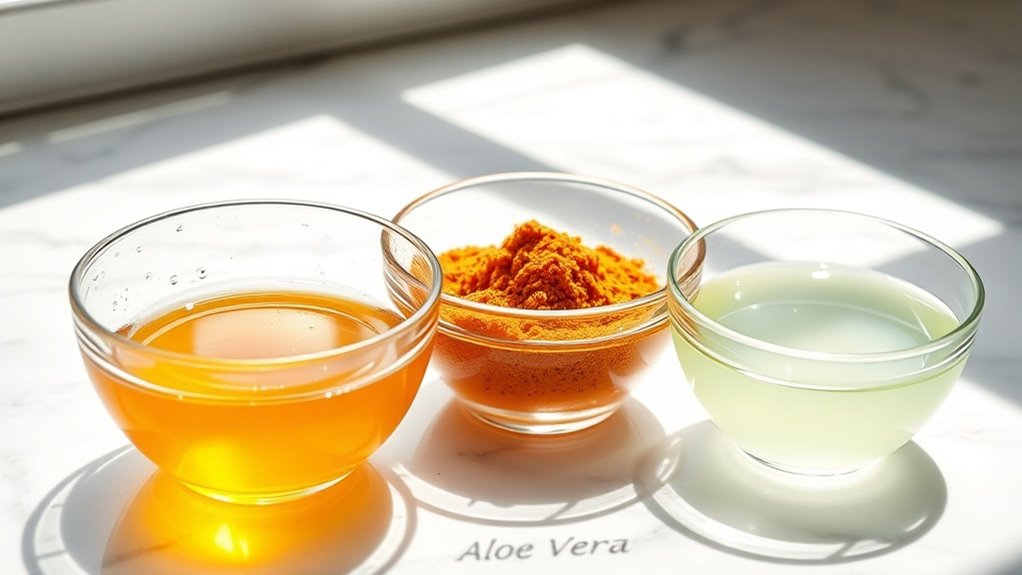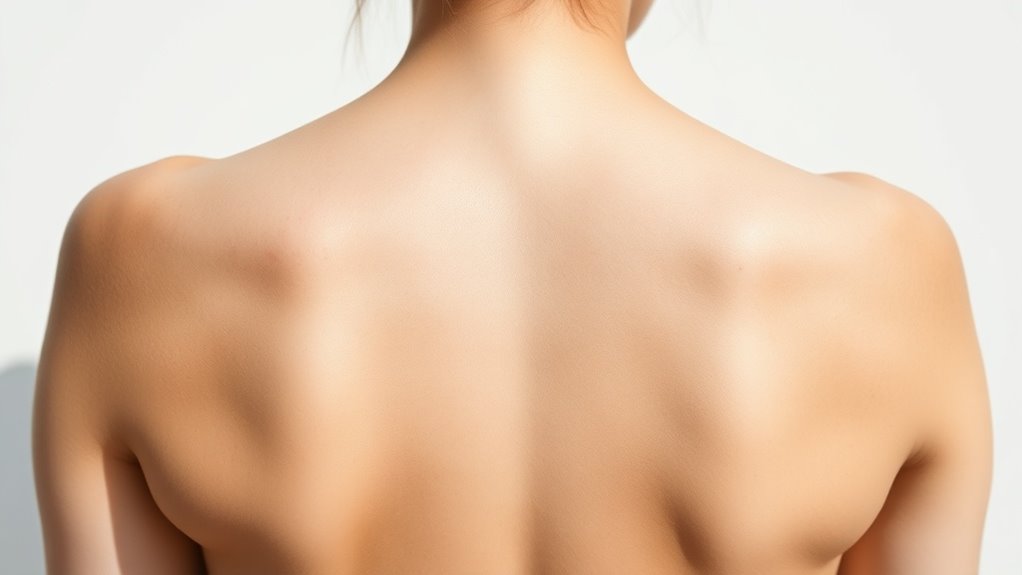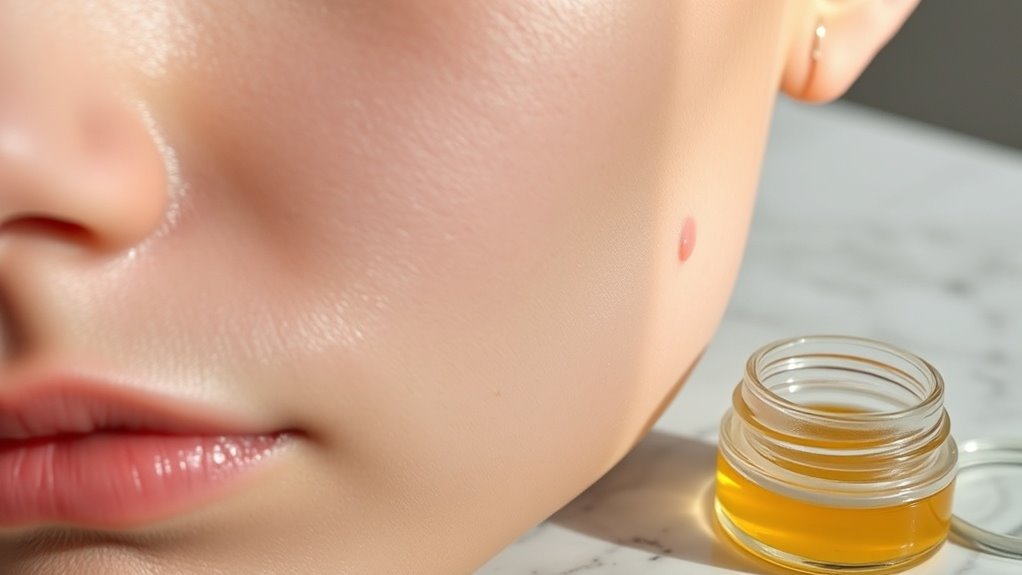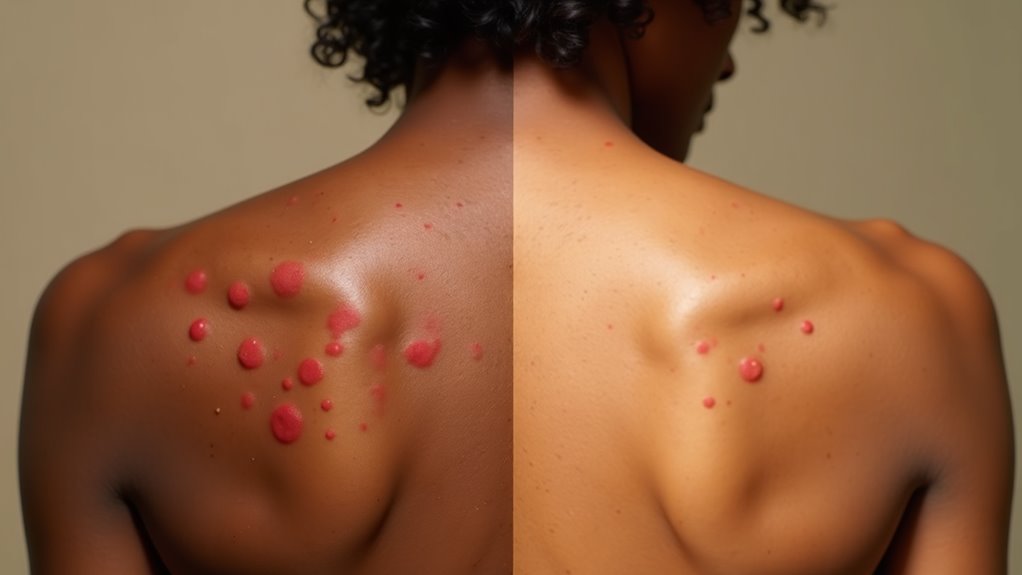Clear up Acne Overnight With This Kitchen Ingredient
You can harness apple cider vinegar’s natural acids and antimicrobial properties to help reduce acne overnight. Create a solution by diluting ACV with water in a 1:3 ratio to prevent irritation while maintaining its acne-fighting power. Apply the mixture gently to affected areas using a cotton ball after cleansing your face. While mild results may appear overnight, understanding proper application techniques and complementary ingredients will maximize your treatment’s effectiveness.
The Science Behind Apple Cider Vinegar’s Acne-Fighting Power
While apple cider vinegar (ACV) has gained popularity as a natural acne treatment, its effectiveness stems from a complex mixture of organic compounds.
The primary active ingredient, acetic acid, may help combat bacteria, while chlorogenic and gallic acids provide antioxidant properties. Additionally, many celebrities rely on targeted acne medication to enhance their skincare routine, which can complement natural treatments like ACV.
However, before trying ACV among other pimple remedies overnight, you’ll need to understand its limitations.
Despite its pH-balancing potential and exfoliating properties through alpha hydroxy acids, research hasn’t confirmed ACV’s efficacy against P. acnes bacteria.
The quick evaporation of ACV also reduces its potential absorption and overall effectiveness in treating acne. Using undiluted ACV can cause chemical burns on skin and should be avoided.
How to Create Your Overnight Anti-Acne Solution
Moving beyond the limitations of apple cider vinegar, you can create a more effective overnight anti-acne solution using scientifically-backed natural ingredients. The key lies in combining proven antibacterial components with skin-soothing elements for best results. This gentle approach helps maintain a healthy skin pH to prevent inflammation and barrier damage.
- Mix one tablespoon of raw honey with 2-3 drops of tea tree oil for potent antimicrobial action.
- Add 1/4 cup aloe vera gel to maintain hydration and reduce inflammation; tea tree oil is particularly effective against acne-causing bacteria.
- Incorporate 1 teaspoon of green tea extract for antioxidant protection.
- Apply a thin layer to cleansed skin, focusing on affected areas.
Always perform a patch test first and dilute active ingredients properly to prevent irritation.
Best Practices for Application and Treatment
Proper application technique makes a significant difference in the effectiveness and safety of apple cider vinegar acne treatments.
Start by diluting ACV with water at a 1:3 ratio, increasing dilution for sensitive skin. Acetic acid in apple cider vinegar helps to exfoliate dead skin cells and reduce acne.
Always patch test before full application.
After cleansing with a gentle face wash, apply the diluted solution using soft cotton balls.
Don’t rub vigorously.
Let it dry naturally before applying moisturizer.
For best results, use the treatment at night and protect your skin with sunscreen the next morning.
Monitor your skin’s response and adjust dilution or frequency if irritation occurs.
Research shows that citric and lactic acids in apple cider vinegar can help improve the appearance of acne scars.
Prepare fresh batches regularly and store properly.
Combining Natural Ingredients for Maximum Results
For enhanced acne treatment, combining specific natural ingredients can amplify their individual therapeutic effects.
Scientific evidence supports several powerful combinations that target multiple aspects of acne formation.
-
Mix tea tree oil with aloe vera to simultaneously combat P. acnes bacteria while reducing inflammation and redness. Natural antibacterial ingredients like tea tree oil can significantly enhance the effectiveness of your treatment.
-
Blend jojoba and argan oils to regulate sebum production and maintain proper skin hydration.
-
Combine green tea extract with manuka honey to maximize antioxidant and antimicrobial benefits.
-
Create a mask using clay and jojoba oil to absorb excess oils while delivering anti-inflammatory compounds.
Research shows that epigallocatechin-3 gallate from green tea can effectively target multiple acne-causing factors simultaneously.
Always perform patch tests before applying new combinations to prevent potential skin reactions.
What to Expect During Your First Treatment
When beginning your first natural acne treatment, understanding the initial skin response helps set realistic expectations and guarantee proper monitoring.
You’ll likely experience mild tingling or warmth upon application. Since acne forms inside pores, it’s important to keep the affected area clean while using any treatment. Monitor for any signs of irritation, such as excessive redness or itching. If these occur, wash the treatment off immediately with cool water. Baking soda’s exfoliation and pH balancing properties may help in reducing acne breakouts effectively.
While you mightn’t see dramatic changes overnight, you can expect some reduction in redness and inflammation, particularly with mild acne. Multiple treatments are typically needed for significant results.
Always perform a patch test first and apply to clean, dry skin using sterile tools or clean hands, avoiding the eye area.
Tips for Long-Term Success and Skin Maintenance
You’ll find lasting success in preventing acne breakouts by implementing a consistent natural skincare routine that incorporates proven kitchen ingredients like honey, green tea, and aloe vera.
Your daily habits, including proper hydration, adequate sleep, and stress management, play a vital role in maintaining clear skin and preventing future flare-ups. Additionally, the use of apple cider vinegar can target bacteria while helping to minimize the appearance of acne scars through its natural acids, which include acetic acid that offers antibacterial properties.
To maximize long-term results, combine these natural approaches with good hygiene practices, such as keeping your hands away from your face and regularly cleaning items that contact your skin.
Prevent New Breakouts Daily
Maintaining clear, healthy skin requires a thorough daily approach that combines proper hygiene, lifestyle modifications, and consistent skincare practices.
-
Wash your face gently twice daily with non-comedogenic products, and always cleanse after sweating to remove acne-causing bacteria. Choose soap-free cleansers that maintain your skin’s natural pH balance around 5.5 to prevent irritation.
-
Monitor your diet by staying hydrated, consuming antioxidant-rich foods, and identifying potential triggers like dairy or high-sugar items
-
Protect your skin by wearing loose-fitting clothes, managing environmental exposure, and keeping hair clean to prevent oil transfer
-
Implement stress-reduction techniques and maintain regular sleep patterns while following your prescribed treatment regimen, whether topical or systemic
Natural Skincare Routine Tips
Looking to enhance your skincare routine with natural ingredients?
Start by incorporating proven elements like aloe vera for soothing inflammation and tea tree oil for fighting bacteria.
You’ll want to maintain consistency in your routine while focusing on proper moisturization with ingredients like jojoba oil.
Don’t skip daily sunscreen application, as it’s vital for preventing skin damage.
Gentle exfoliation helps remove dead skin cells, but don’t overdo it.
Stay hydrated and consider adding chamomile or oatmeal-based products for their anti-inflammatory benefits.
Clinical studies show these natural approaches are as effective as synthetic alternatives, particularly for sensitive skin.
Healthy Habits For Skin
Want glowing, healthy skin for the long haul?
Research shows that consistent skincare habits yield the best long-term results.
While products matter, your daily routine and lifestyle choices greatly impact skin health.
-
Stay hydrated – 48% of people don’t drink enough water, yet proper hydration is essential for skin cell regeneration
-
Prioritize sleep – 54% of people are sleep-deprived, which directly affects skin repair
-
Follow a consistent routine – Only 50% of Americans maintain regular skincare habits
-
Protect from sun damage – Use SPF daily and minimize direct sun exposure for ideal skin health
Combining these evidence-based practices with your skincare regimen will enhance results and maintain skin vitality.
References
- https://www.healthline.com/nutrition/13-acne-remedies
- https://www.webmd.com/skin-problems-and-treatments/acne/features/best-ingredients-for-acne-prone-skin
- https://www.dermatologynwhouston.com/5-natural-ingredients-that-may-help-calm-acne/
- https://embracecomfort.com/4-kitchen-ingredients-that-can-help-treat-acne/
- https://www.youtube.com/watch?v=NevvB-90wjs
- https://www.healthline.com/nutrition/apple-cider-vinegar-and-acne
- https://www.ijpsjournal.com/article/The+Efficacy+of+Apple+Cider+Vinegar+in+Treating+Acne+Vulgaris+Review+of+Literature
- https://www.medicalnewstoday.com/articles/apple-cider-vinegar-for-face
- https://pubmed.ncbi.nlm.nih.gov/34077434/
- https://curology.com/blog/does-apple-cider-vinegar-work-for-acne/

